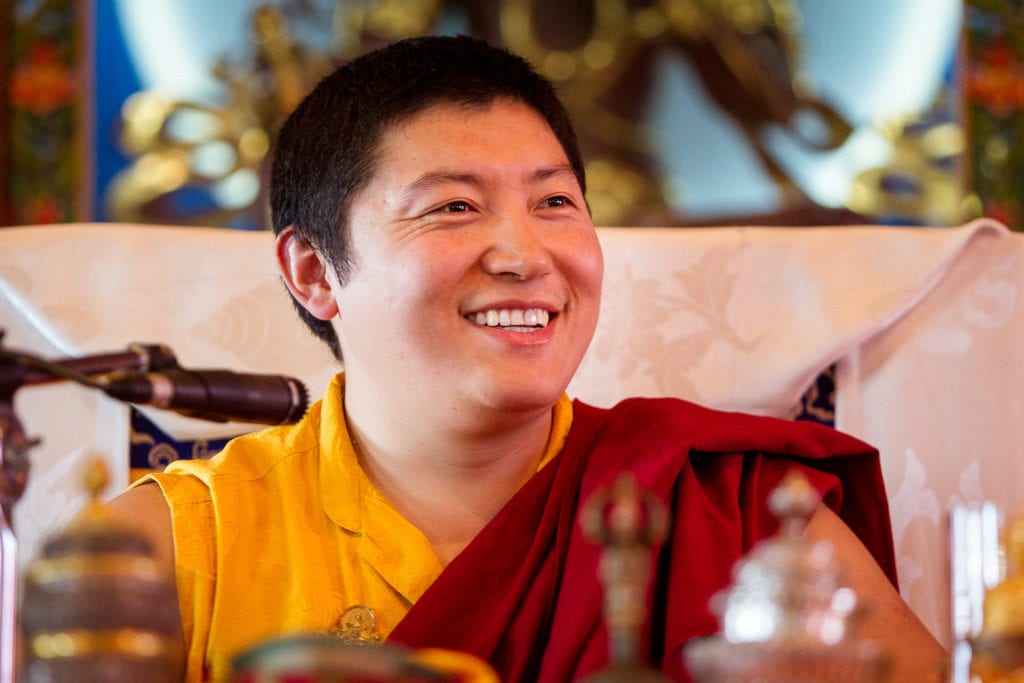Genuine Compassion
Genuine compassion, Phakchok Rinpoche explains, is compassion free of any aggression. Moreover, that compassion does not have grasping. This compassion is much more gentle. Ultimate or genuine compassion does not have the thought, “I need to save real sentient beings.” There is no sense of the real “I” here, nor of any real suffering. When we have those concepts, we are talking about a gross type of compassion. Genuine compassion doesn’t have concepts.
Practicing Genuine Compassion
In order to practice genuine compassion, we train by alternating between resting in mind nature and then allowing compassion to naturally arise.
So first, let yourself relax in mind nature, and rest. After that, arouse compassion. And then, think gently, “May all sentient beings be free from suffering…” As you do that, recall that you and all beings are illusions and then you look at the mind. Rest again.
Then again, gently think: “May all sentient beings who don’t realize this come to realize this.” And then again rest.
Alternate. When we say, “alternate,” that means we rest, and then we arouse compassion over and over again. Rest — and then arouse compassion. When we practice this way, alternating, our compassion becomes more and more subtle. Our attachment gradually reduces and then, that compassion becomes much more gentle compassion.
Improving Compassion
Many of us have a wish to improve our compassion. But why is this difficult for us? Because our ordinary compassion is too ego-based. It’s mixed up with self-clinging. We like compassion, but why can’t we do we find it so hard to practice compassion correctly? Because as Rinpoche teaches, our compassion becomes too picky or not equal. It is not yet genuine compassion.
Then, why does compassion not come? We have too much emotion. And why is our compassion not perfect? When we practice, we are often too judgmental. So, why can’t we improve our compassion? Because we worry too much. We overthink and worry: “I cannot save everybody.” Then we get discouraged. When we try to improve compassion, we run up against a lot of small problems that actually do not help our compassion to grow.
Improve Compassion by Alternating Compassion Practice
When we alternate practice by resting in meditation and then reflecting on compassion, our compassion arises naturally. In this way, first we rest, and then think, “All mother sentient beings …” while we bring forth the thought of compassion. When we start with a meditative mind and then generate compassion, this is not normal compassion. Normal compassion comes from an uptight view.
Subtle Compassion
When we begin with an understanding of the view of emptiness, our compassion is different. This compassion is much more subtle because we understand the subtle issue that people normally don’t see. The subtle issue is not the suffering of bad education, bad health, no food, or bad karma. Those are gross manifestations of suffering. Instead, the true subtle issue is the subtle ignorance. So, because we understand that, our compassion arises because sentient beings do not see this ignorance. They aren’t aware of how they can become free.
As we meditate — for a split second we experience that freedom. So we trust that it is really possible. But sentient beings don’t see that and therefore they cannot be free. When we see that, our compassion arises effortlessly. How many people actually go through difficulties? We see this, and as we see it, we know that they could actually be free from that even for just a split second. Now the type of compassion that arises is very different from our normal compassion.
Normal Compassion
Normal compassion is the thought that “I have a very good seat and this person doesn’t have a seat.” Or we think, “I have a very good leg and this person doesn’t have a leg. I have money and that person doesn’t have any money.”
We even do the same with our dharma practice, “I know how to do shamatha meditation and he doesn’t know how to do shamatha meditation.” Don’t we all think like that? And that involves a lot of self-reference and judgment.
Gradual Development of Non-conceptual Compassion
But compassion based upon understanding of emptiness is much more subtle. That type of compassion is pure. Our meditation will resonate with compassion. This compassion becomes slowly less conceptual.
It is not going to come within a day, but every time we alternate practice like this in our sessions, then the compassion actually changes. When we proceed this way, compassion does not have a kind of aggression. Subtle compassion does come with heroism. This compassion does not come with the thought that I am going to fix everybody’s worldly problems. Normally, when we can’t fix all the problems, we feel upset and we get discouraged and think there is no point.
But non-conceptual compassion is not going to be like that. Naturally the compassion will become perfected. It will manifest as genuine and courageous. That is why we call this non-conceptual compassion.
Reflection question
How do you generally practice compassion? Investigate your own behavior carefully. Do you attach strings to your compassion? If so, just be aware that this is the case and make aspirations to change that motivation. Do you get discouraged when you practice compassion if things don’t go the way you expect them to turn out? We often do that. Don’t judge yourself, but just see this habit.
Take some time to reflect on the reality that sentient beings experience so many types of unhappiness and dissatisfaction because they don’t understand their true nature. Really let that thought seep in to your heart until you feel it in the core of your being. How does that change the way you experience compassion?










Responses